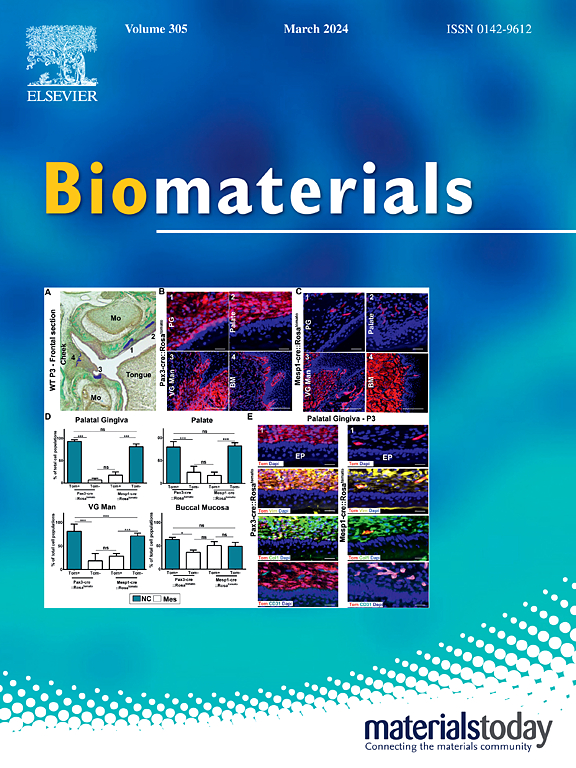A novel radio-immunotherapy strategy: Gut microbiota metabolite combined with radioactive hydrogel for the treatment of low rectal cancer
IF 12.8
1区 医学
Q1 ENGINEERING, BIOMEDICAL
引用次数: 0
Abstract
Colorectal cancer (CRC), especially low rectal cancer, often requires surgical resection of the anus, which severely affects the quality of life of patients. This study aims to develop a novel treatment method that can effectively control tumor growth while preserving anal function. We design a radioactive hydrogel (177Lu-RH) based on the cross-linking of metal ions and sodium alginate, which can be directly injected into the tumor to achieve local radiotherapy. In mouse experiments, we observe significant differences in the therapeutic efficacy of 177Lu-RH among treated mice. Through 16S rDNA microbial diversity and targeted metabolomics studies, it has been revealed that the intestinal microbiota, particularly the Rikenella bacteria, and their metabolite propionate, are positively correlated with a favorable treatment response. We subsequently select the genus Rikenella, which exhibit a significantly higher abundance in the near-complete response (nCR) compared to the partial response (PR) group, for further mechanistic investigation. We discover that propionate, a metabolite produced by Rikenella, plays a crucial role in promoting tumor cell apoptosis and may augment the efficacy of tumor immunotherapy. Therefore, we improve the radioactive hydrogel by adding sodium propionate (SP) to form 177Lu-RH@SP. In vivo experiments show that 177Lu-RH@SP combined with anti-programmed death ligand 1 (αPD-L1) not only inhibits tumor growth but also promotes DC maturation and reverses T cell exhaustion, thereby enhancing the efficacy of tumor immunotherapy. Our work provides a new approach for the treatment of low rectal tumors, with the potential to improve the prognosis and quality of life for patients.
一种新的放射免疫治疗策略:肠道微生物代谢物联合放射性水凝胶治疗低位直肠癌
结直肠癌(CRC),尤其是低位直肠癌,往往需要手术切除肛门,严重影响患者的生活质量。本研究旨在开发一种新的治疗方法,可以有效地控制肿瘤的生长,同时保持肛门功能。我们设计了一种基于金属离子与海藻酸钠交联的放射性水凝胶(177Lu-RH),可以直接注射到肿瘤中,实现局部放疗。在小鼠实验中,我们观察到177Lu-RH在治疗小鼠中的治疗效果有显著差异。通过16S rDNA微生物多样性和靶向代谢组学研究发现,肠道微生物群,特别是里肯氏菌及其代谢物丙酸盐与良好的治疗反应呈正相关。我们随后选择了Rikenella属,与部分反应(PR)组相比,它在接近完全反应(nCR)中表现出明显更高的丰度,用于进一步的机制研究。我们发现丙酸是里氏菌产生的代谢物,在促进肿瘤细胞凋亡中起着至关重要的作用,并可能增强肿瘤免疫治疗的疗效。因此,我们通过添加丙酸钠(SP)来改进放射性水凝胶,形成177Lu-RH@SP。体内实验表明177Lu-RH@SP联合抗程序性死亡配体1 (αPD-L1)不仅能抑制肿瘤生长,还能促进DC成熟,逆转T细胞衰竭,从而提高肿瘤免疫治疗的效果。我们的工作为直肠低位肿瘤的治疗提供了一种新的途径,有可能改善患者的预后和生活质量。
本文章由计算机程序翻译,如有差异,请以英文原文为准。
求助全文
约1分钟内获得全文
求助全文
来源期刊

Biomaterials
工程技术-材料科学:生物材料
CiteScore
26.00
自引率
2.90%
发文量
565
审稿时长
46 days
期刊介绍:
Biomaterials is an international journal covering the science and clinical application of biomaterials. A biomaterial is now defined as a substance that has been engineered to take a form which, alone or as part of a complex system, is used to direct, by control of interactions with components of living systems, the course of any therapeutic or diagnostic procedure. It is the aim of the journal to provide a peer-reviewed forum for the publication of original papers and authoritative review and opinion papers dealing with the most important issues facing the use of biomaterials in clinical practice. The scope of the journal covers the wide range of physical, biological and chemical sciences that underpin the design of biomaterials and the clinical disciplines in which they are used. These sciences include polymer synthesis and characterization, drug and gene vector design, the biology of the host response, immunology and toxicology and self assembly at the nanoscale. Clinical applications include the therapies of medical technology and regenerative medicine in all clinical disciplines, and diagnostic systems that reply on innovative contrast and sensing agents. The journal is relevant to areas such as cancer diagnosis and therapy, implantable devices, drug delivery systems, gene vectors, bionanotechnology and tissue engineering.
 求助内容:
求助内容: 应助结果提醒方式:
应助结果提醒方式:


